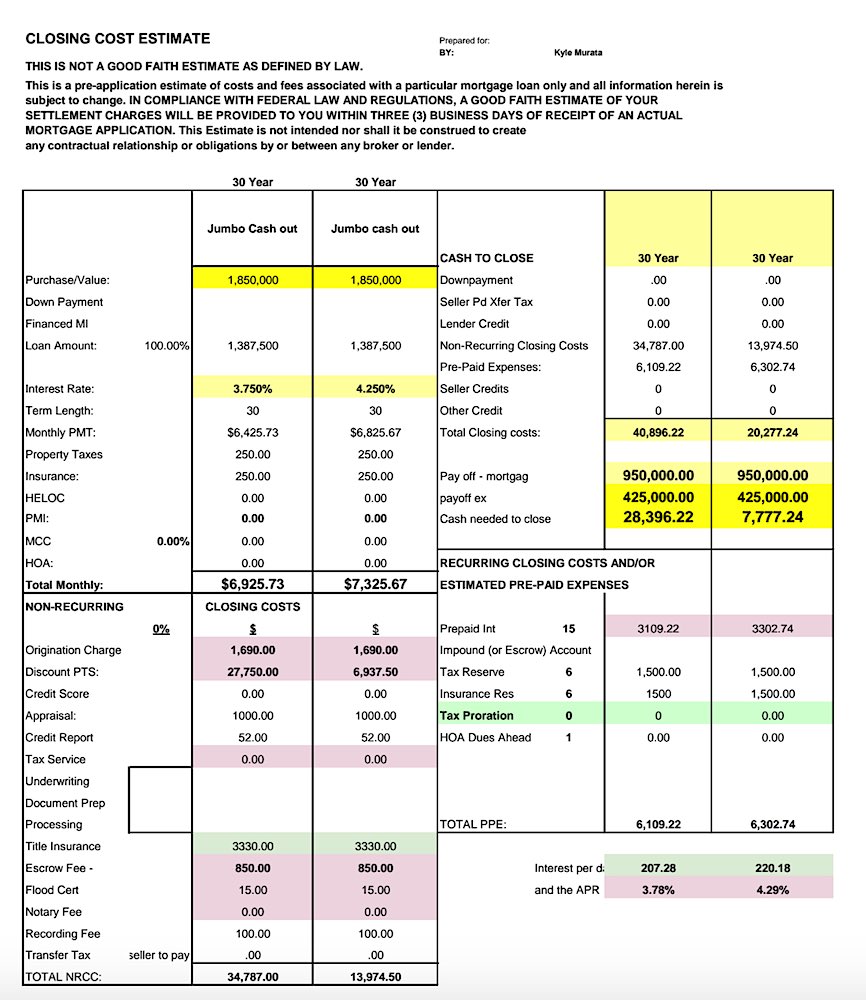Divorce is never an easy undertaking and can be especially stressful when jointly owned property is involved. Unfortunately I speak from experience as I myself have gone through it. I’m definitely not alone as almost half of every marriage in the United States ends up in divorce. These stats are brutal, and do not even convey the emotional and financial toll involved.
My best piece of advice is: “Don’t get divorced and try work it out with your spouse. “ It will save you a lot of stress and pain…
Of course it takes two willing parties and more often than not the marriage cannot be saved.
So my second best piece of advice is: Make every effort to get through the divorce as amicable as possible. It will save both parties a lot of money and grief.
No divorce is the same and there is obviously no one size fits all approach. Apart from child custody and alimony the other big issue is the family home.
Hawaii is a no fault divorce state and the division of property is equitable no matter who is at fault or what spouse wants the divorce. If the divorcing parties cannot agree on how to divide their property the decision is made by family Court within the Judgement of Divorce. Most commonly the jointly owned home is the biggest asset and the one needing the most consideration. So it is of great benefit to both spouses to come to an agreement as soon as possible during the divorce proceedings.
When it comes to the family home more often than not, there is no other alternative than selling it, especially in Hawaii, where property values are some of the highest in the nation. For most married couples the monthly mortgage payment is a big burden on the family budget and in the event of a divorce no one partner will have the financial means to take over the whole mortgage payment, let alone buy out the other and give them their fair share of the equity.
Here is a real life example (the couple’s names were changed to protect their privacy):
Jane and John Doe own their family home in Kailua – Kuulei Tract, a very desirable neighborhood near Kailua Beach. They bought it for $1,000.000 in 2005 and then refinanced a couple of times to make improvements to the pool and to add an extra bedroom above the garage. The mortgage on the home is $950,000 and the monthly payment comes out to $5,300/month. They both have good jobs so the mortgage payment is within their budget. Let’s assume the best case scenario in which the soon to be exes are working together to make the divorce uncontested and as amicable as possible.
Jane Doe loves her home and wants to keep it. For that to happen she first needs John to cooperate.
This is of course only the first step and it does not get much easier after that, especially in the hot Oahu real estate market.
The home now is worth a lot more money than when John and Jane purchased it in 2005. Comparable homes now are selling for up to $2 million. So there is a lot of equity in the home that belongs to both Jane and John. In order to determine the market value of the home these are the two most popular choices:
A professional appraisal: This is the most in depth and detailed way to determine the current market value of a property and appraisals carry a cost that easily is $500 or more. It is definitely the way to go if cost in not a consideration. The fact that both parties are willing to pay for an appraisal makes it a lot more likely they will accept the outcome and abide by it.
A Comparative Market Analysis (CMA): This is a service performed by licensed real estate agents and since the same data of comparable sales is used as with a professional appraisal it is in most cases a very reliable alternative. Any agent will gladly provide this service for free, since this may lead to a future listing.
Jane and John do not want to pay for an appraisal since they already have a good idea of how much they can sell their home for. They looked at comps in their area and then agreed to ask a trusted realtor for a CMA. The realtor they asked was not a family friend or anyone close to either of the two. For this CMA to be accepted by both Jane and John they had to go with a realtor they both did not know personally. They got a list of names from their divorce mediator and after a bit of research on each of them agreed on a particular one that recently had sold a home in their neighborhood. The CMA looks at comparable sales in the area and adds or deducts value based on factors such as size of home and lot, number of bedrooms, view, frontage and condition of home, just to name a few. It is an extensive report and definitely a good indicator of value.
The CMA found that Jane and John’s Kuulei Tract home had a market value of $1,850,000 which meant it went up by a whopping $850,000 in just 11 years! So the shared equity in the home is $850,000 which means that Jane has to pay half of that to John in order to buy him out.
So not only will Jane inherit the old debt from their joint mortgage of $950,000 but also now has to find and extra $425,000 to pay out John. The Closing Cost Estimate below shows how this can be done through a so called Cash-Out Refinance loan.

The most important numbers to look at are ‘cash needed to close’ and ‘monthly payment’. The above scenario shows that Jane has to cover close to $7,000 a month to make her wish of keeping the family home a reality. That does not include utilities and the monthly bill to the pool man, just to mention a few. Jane looks at her income and how much money she would have to come up with every month in addition to the $7,000 in mortgage payments and immediately knows she cannot afford to buy out John.
Jane is devastated and tells John that she cannot afford to keep the home. John already knew that this was going to happen and he then suggests another scenario to Jane that does not involve the immediate sale of the home and will keep Jane in the home.
This scenario by the way carries risk and should only be entered into with the help of a divorce attorney who will draft the documents for both parties to sign.
John’s offer to Jane is the following: Jane and John will keep the home and mortgage in both their name, but Jane will live in the home and agrees to pay the full mortgage payment of $5,300/month. John gets to keep half of the annual mortgage interest tax deduction and tenancy to the home will switch to Joint Tenancy. They also agree in writing that the house will be put on the market should she be late on her mortgage payments and that the home will be put up for sale once the youngest of their children reaches the age of 18. Jane is relived and thankful for having such a nice and understanding ex. She can afford the monthly payments and agrees to the terms that John asked for. John on his part is also happy with the arrangement, since it gives his kids a better chance to cope with the divorce and since Kailua is such a hot market the property will just get more valuable over time.
There are quite a few variations to the above scenario and they all have one thing in common: They only work when both parties work well together and are in agreement. So most likely this will only work in an uncontested divorce.
Silly question to Jane and John: ‘if you guys can get along so well with making the divorce so smooth and amicable why don’t you try to work on your marriage?’
In my 16 years working as a real estate professional I have dealt with a lot of divorce related issues and I think I’ve seen and heard it all from restraining orders to refusal to sign final closing docs to flat out scorched earth war. So when my marriage came to its unfortunate demise I knew it was the very best to just be as amicable and accommodating as possible. Luckily my ex felt the same way and we got to settle all our issues with that attitude in mind.
More likely than not the only realistic option for both parties is to sell. Paying the whole mortgage alone is most often too difficult, so the above solution does not work for a lot of couples, even if they are working things out in a friendly, respectful manner…
Selling your home during a divorce is added trauma and stress, especially when kids are involved. Leaving the family home and not having mom and dad together anymore is quite a double whammy for any child, young or old. Remember, they did not choose you. They are the collateral damage in this and need to be treated with love, compassion and patience.
Finding the right realtor to help in such a touchy situation is crucial. The worst mistake divorcing couples make is to hire a family friend to take the listing. This will open up a whole set of new problems, most of them not relating to the real estate per se but to potential conflict of friendship and loyalty that the realtor may or may not have to one of the parties involved. There are over 4000 real estate professionals in Hawaii, so it should be pretty easy to pick one that both parties do not have any type of relationship with. A suggestion would be to jointly interview three realtors and then agree on the one that takes the listing. Remember, selling a home involves quite a bit of paperwork and both parties need to sign off on contracts, escrow documents etc. So both soon to be exes will again have to communicate and work together.
Ironically good communication and working well together is also a great way to staying married, which brings me to back to the beginning of this article:
‘Don’t get divorced and try work it out with your spouse’
Having gone through the whole process of divorce just a few years ago, I cannot emphasize enough how important it is to have trusted friends and family there for support. Another very important aspect is the professional support system of counselors, attorneys and financial advisors. There are numerous resources available on line and I highly recommend doing research and getting recommendations from friends and family.
Tom Digrazia is a personal friend of mine and I highly recommend his services – http://www.divorcesource.com/HI/pages/digrazia.html. He is an expert peacemaker and mediator and has authored many books on this topic. His law practice specializes in mediation between divorcing couples in order to bring about what he calls an ‘Educated Divorce’ that will be uncontested and won’t cost a fortune.
Please feel free to contact us with any questions or comments.
